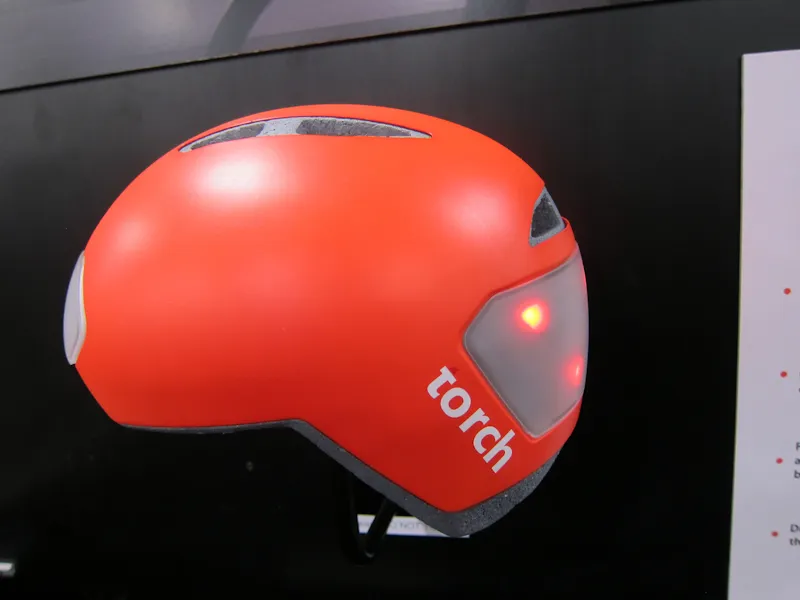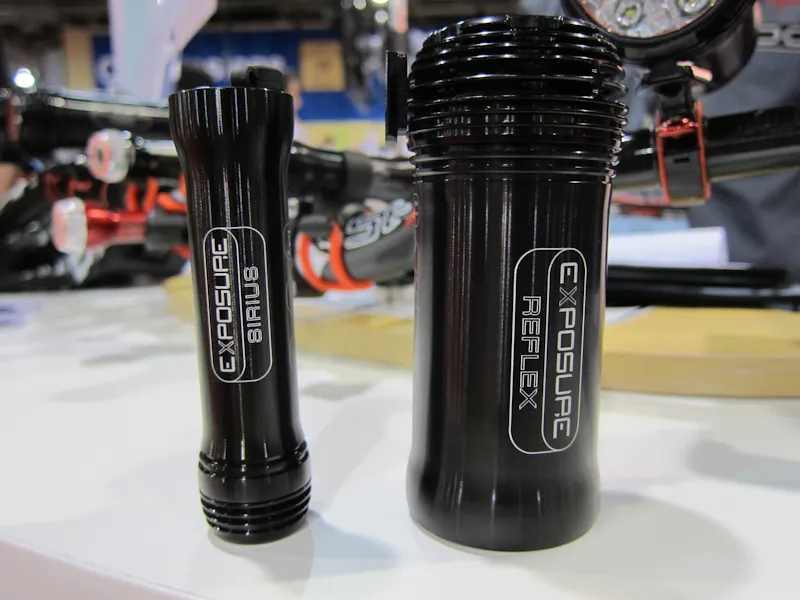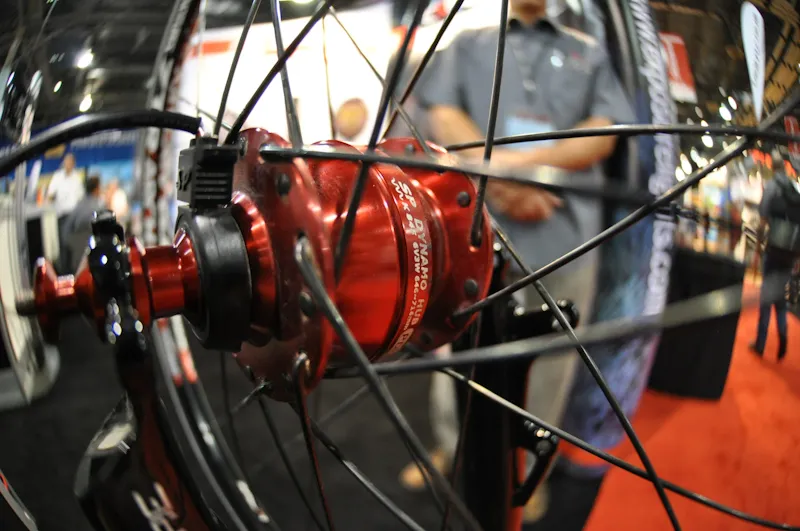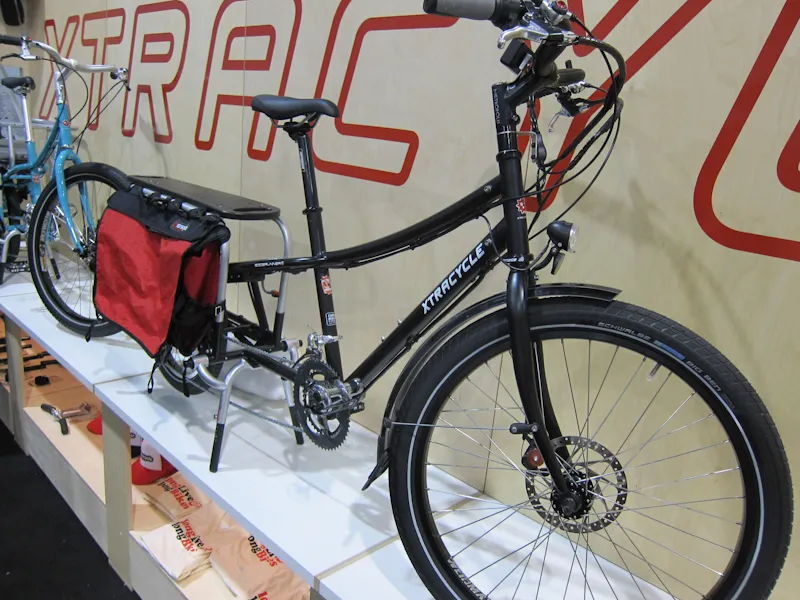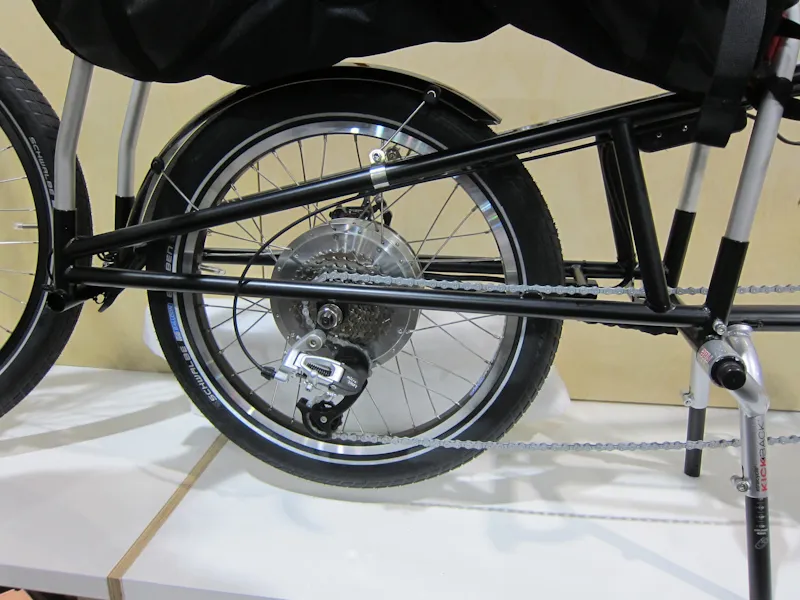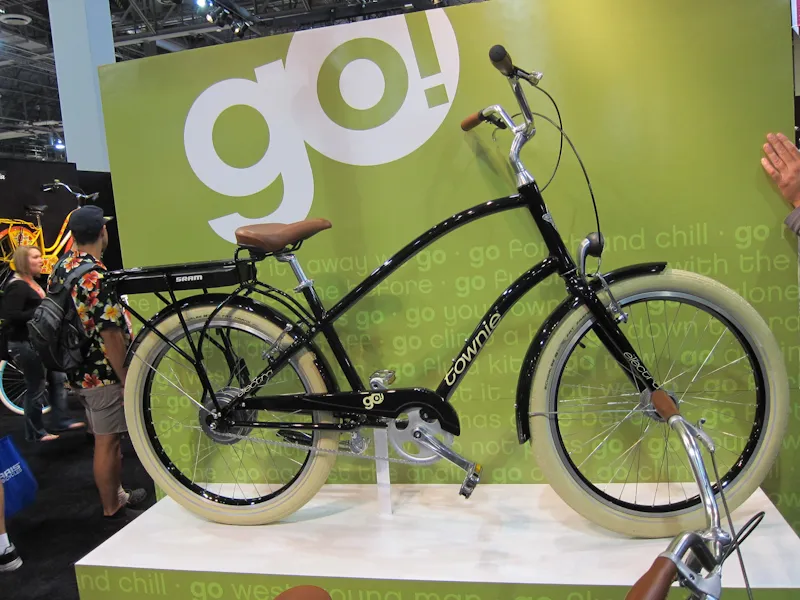An encouraging number of casual around-town bikes and more serious commuter machines were shown at Interbike in Las Vegas this year. We also found a few good accessories that could improve your ride home from work now that the days are growing shorter.
Here is a look at some of the best we found.
Breezer
Breezer’s Beltway is a clean-looking, well-thought-out commuter bike. As its model name would suggest, the Beltway uses a Gates belt drive, which is all but maintenance-free. Belt tension is adjusted via an eccentric bottom bracket. Belt installation is stealthy: The forged driveside drop-out is pierced by a flat-head Allen key bolt tucked into the underside, which threads into a spherical nut hidden in the chainstay. Without it being pointed out, the belt access point is all but invisible.
The Beltway is available as a singlespeed for $999, with a NuVinci N360 continuously variable transmission hub for $1,599, or as an 11-speed with Shimano Alfine for $2,099. All versions should be available by the end of December.
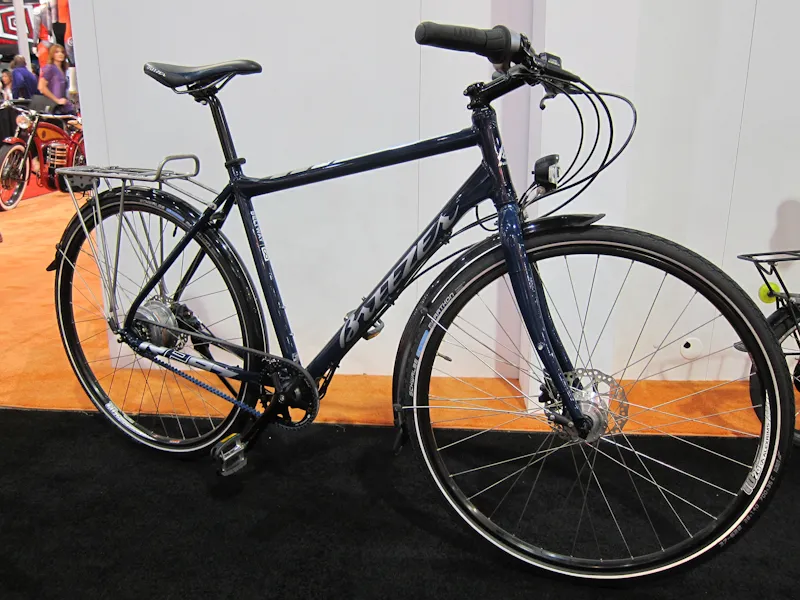
The Beltway is a smart, belt-driven commuter
Bullitt
Bullitt is now being imported from Copenhagen into the US at approximately 100 bikes a year, and growing. Weighing in at 50lbs, the utility bike is rated for loads of up to 400lbs, and is generally spec’d with downhill-specific disc brakes like Shimano Zee. Pricing reflects the limited production and quality at around $4,000 for a typical build.
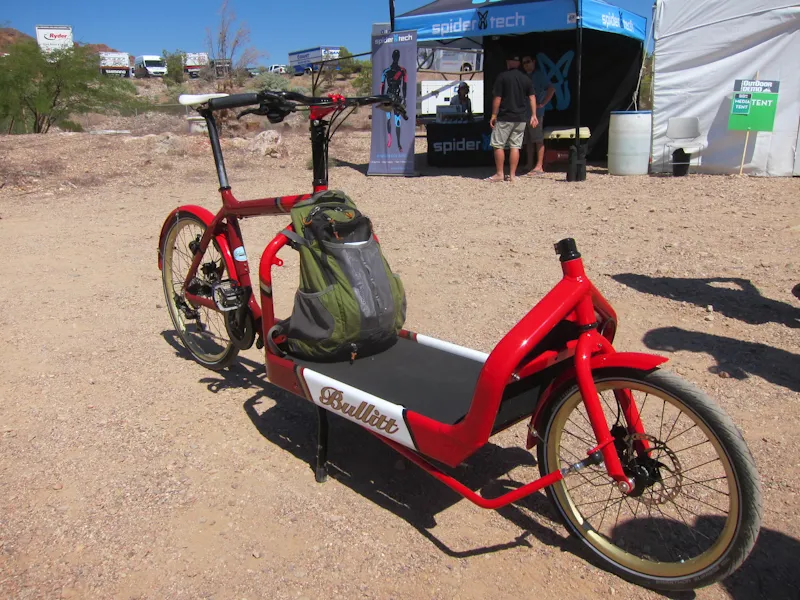
For the handful of people who lust for such things, Bullitt has the high-end cargo bike market covered
Yuba
On the other end of the financial and weight scale of utility bikes from Bullitt comes Yuba’s brand new Boda Boda. With a price tag at $999 and weighing in at 35lbs, the aluminum bike is rated to carry 220lbs on its rear rack. It’s also one of the few utility bikes that offers a step-through frame model. The Boda Boda is available in medium and large sizes, with a claimed range between the two of 4’7”/140cm to 6’5”/196cm.
Another appreciated feature on such a long bike is that the ‘S’ downtube allows the front wheel to be turned 180-degrees, shortening the wheelbase enough to allow the Boda Boda to fit in a city bike rack much more easily.
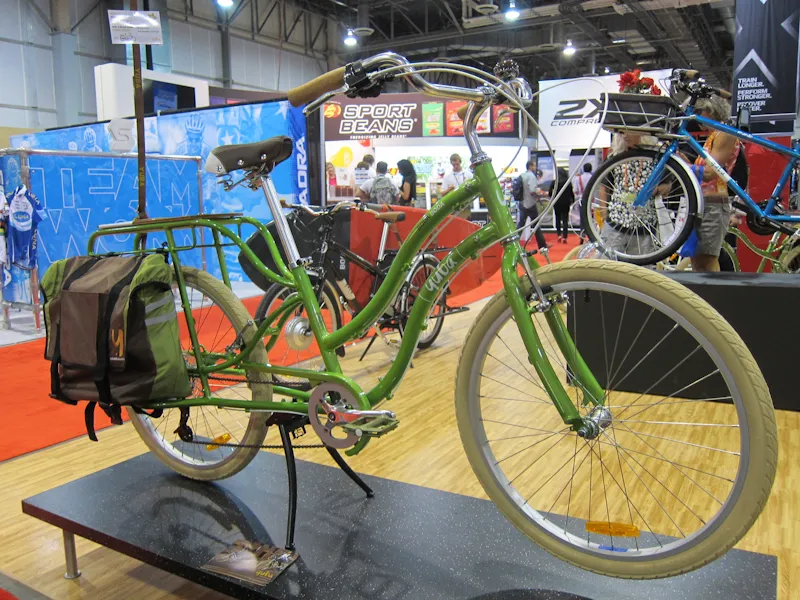
The Boda Boda can carry up to 220lbs on the rear rack
Xtracycle
The makers of the original bolt-on LongTail utility bike system are now offering a one-piece frame, the EdgeRunner. The new frame also features a 20in rear wheel that drops the cargo platform 6in from the height of one atop a 26in wheel, provides a stronger wheel under cargo loads, and offers better torque for power-assisted models.
There will be many build options, but a ballpark price for the new EdgeRunner is around $2,000, and closer to $4,000 for one with a rear-hub motor pedal assist.
The bolt-on LongTail will also be available in the new 20in wheel configuration, at a price of $199.
Still need more cargo capability? Xtracycle’s SideCar is a modular, proprietary option that slips into the side of the EdgeRunner’s frame, and provides a payload potential that is most likely limited to a rider’s pedaling or creativity abilities than its platform’s square footage(read: didn’t actually get the platform’s dimensions). The SideCar will be available for $150 without a platform for those do-it-yourselfers, or $200 with a wooden deck.
Xtracycle is aiming for an availability date of mid-March for the EdgeRunner, new LongTail and SideCar.

Need to haul eight pizzas? With a SideCar, it's no problem
Electra
If you'd like a little help while pedaling, the Electra Go! Townie is a stylish and streamlined option. Steering away from the traditional added wires, cables, digital readouts, and extra controls, Electra opted to run the necessary wiring through the frame. The Go! Townie also keeps the SRAM pedal assist very simple in that there isn’t a way to adjust the extra push - it simply kicks in at a factory setting to help you along. Whether this kind of system works for all sizes and fitnesses of riders is to be determined, but the cleanliness and simplicity of the bike’s design as a whole is great.
Look for the Go! Townie to ship to dealers in early 2013 with a retail price of $2,199.
Exposure
Exposure introduced the Revo, which is an 800-lumen light that’s compatible with any Dynamo generator hub. The Revo will be available in mid-October for $299 as a light/wiring kit combo, or $399 for the light/wiring kit/Dynamo hub.
Also new for 2013 are the 360-lumen Sirius at $189, and the 2200-lumen Reflex for $599. Both models are self-contained units like most of the Exposure line, and are said to have more robust and efficient batteries compared to last year, and provide 2hr and 3hr of battery life, respectively, at maximum lumen output.
Another interesting piece of technology found throughout the Exposure line is something they call Accellerometer. The internal meter detects speed variations, and dims or brightens light output accordingly. For instance, if average speed drops to climbing pace, the light will dim, increasing both battery life and decreasing overheating potential as well.
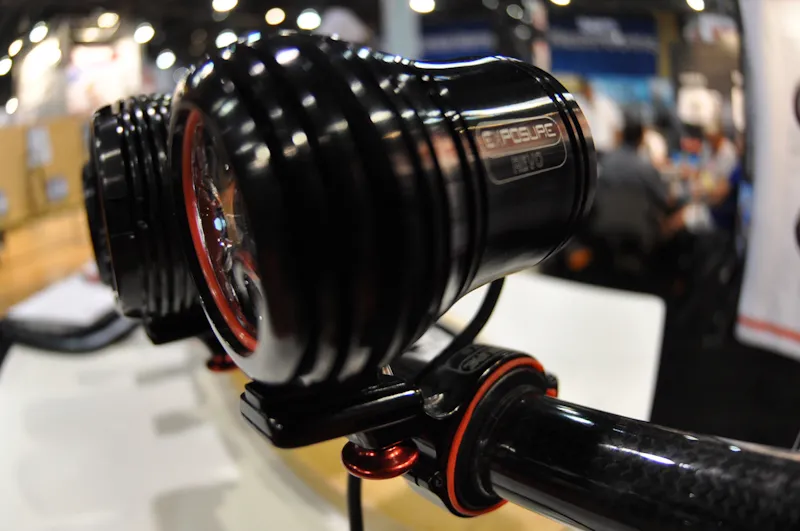
The 800-lumen Revo runs on pedal power
Torch
LED panel technology is trickling into wearable cycling safety, as was on display at the Torch booth. Both their Flux backpack and T1 helmet use integrated LED panels that essentially turn them into giant blinky lights for nighttime visibility, yet blend in to the design of each when not in use. Torch is aiming for a retail price of around $150 for the pack, and $120 for the helmet. Look for Torch’s two commuter-friendly offerings sometime in December.
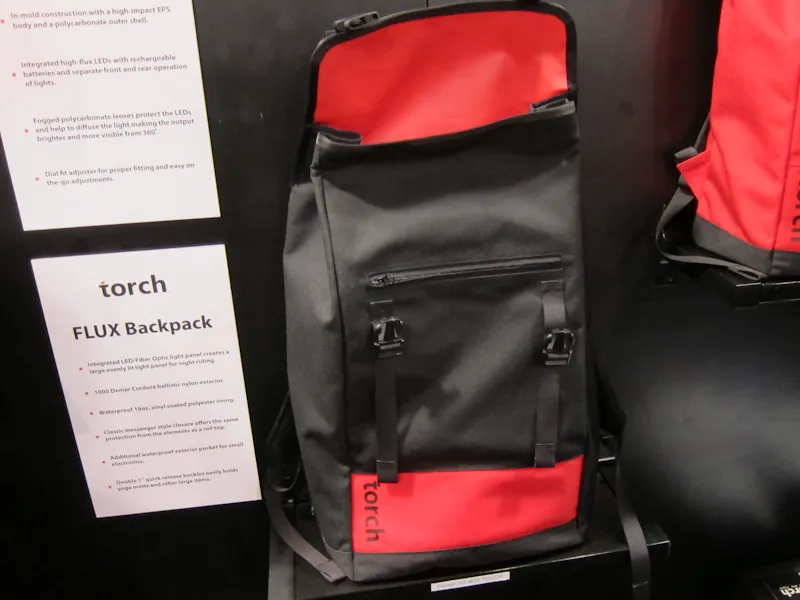
Can you see the integrated LED lights? No? During the daytime, that's the point. At night, the bag lights up
